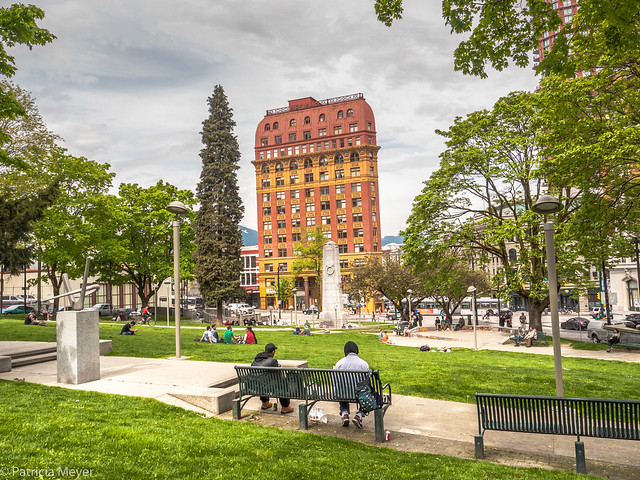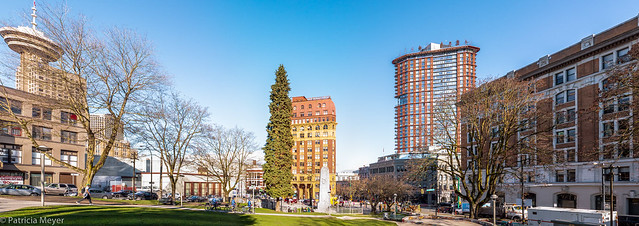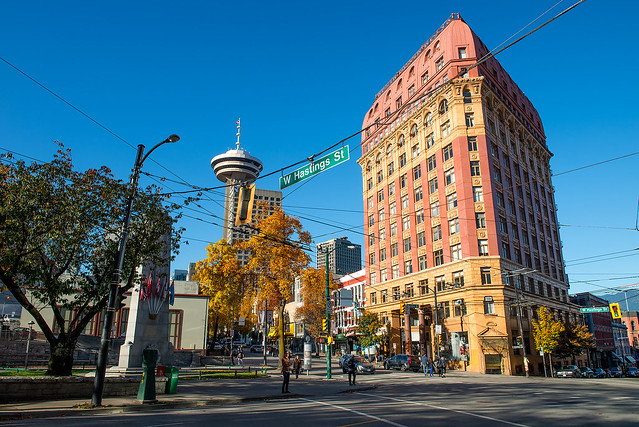Vancouver Icons: Dominion Building
In 1910 it was the tallest commercial building in the British Empire as well as Vancouver’s first skyscraper. The distinct Dominion Building still commands attention today, standing above Victory Square at Hastings and Cambie.

 (Left) 1908 Construction. VPL Accession Number: 6884. Photographer: Philip Timms
(Left) 1908 Construction. VPL Accession Number: 6884. Photographer: Philip Timms(Right) 1912 VPL Accession Number: 13678. Photographer: R. Broadbridge.
The nearby Sun Tower claimed the title of tallest in the empire just a few years later but the style and architecture of the Dominion Building is admired to this day.
From about 1905 on, Vancouver was in the midst of an unprecedented economic boom. Structures built during the boom period, including the Dominion Building, were of a new scale and design. Despite outward appearances of earlier design, they were among the most advanced buildings of their time. They used steel girders and concrete as basic structural elements and remained, well into the 1940s, the ‘modern’ buildings of downtown Vancouver. The centre of this commercial district was Courthouse Square, now Victory Square. [Source: Historic Places]


(Left) 1927 VPL Accession Number: 6434. Photographer: Leonard Frank.
(Right) Photo credit: Patricia Meyer on Flickr
To a steel-framed Chicago-style high rise, architect J.S. Helyer added classical columns, Sullivanesque detailing above the tenth floor, and a Second Empire curved mansard roof. The interior design was even more unusual: a central core design with a ten-storey spiral staircase. [Source: Historic Places]
An urban legend tells the tale of Helyer’s demise within the skyscraper that he designed. Some say he died by his own hand in his office and others say he tripped and fell down the interior staircase — where his ghost is reported to have been see on the seventh and eighth floors.
The building is no stranger to fiction as it has been featured in several big and small screen productions over the years. From local music videos to Battlestar Gallactica, Blade: Trinity, Alcatraz, and The Neverending Story.

The Dominion Bank sold the building in 1943 to S. J. Cohen, president of the Army and Navy Department Stores, who intended to convert it into a multi-storey department store at the end of the war. These plans were never carried out. When the Dominion Bank merged with the Bank of Toronto, a branch of the new Toronto-Dominion Bank was housed in this building. [Source: Historic Places]
The Dominion Building today is home to a variety of tenants in offices, workspaces, and showrooms along with Opus art supplies and a restaurant, Nuba, on the corner.
Other Vancouver Icons posts include: Science World, Gastown Steam Clock, SFU Burnaby, Commodore Lanes, Siwash Rock, Kitsilano Pool, White Rock Pier, Main Post Office, Planetarium Building, Lord Stanley Statue, Vancouver Library Central Branch, Victory Square, Digital Orca, The Crab Sculpture, Girl in Wetsuit, The Sun Tower, The Hotel Vancouver, The Gassy Jack Statue, The Marine Building, and The Angel of Victory. Should you have a suggestion for the Vancouver Icons series please feel free to leave a note in the comments. It should be a thing, statue, or place that is very visible and recognizable to the public.
















1 Comment — Comments Are Closed
The story of the death of John Helyer, the building’s artchitect, can probably be traced to this comment by architectural historian Edward Mills, written in 1973. “While on a tour of inspection, its architect suffered a fall on his magnificent staircase and never fully recovered. His son Maurice Helyer took over the firm and supervision of the Dominion Building’s construction”. John and Maurice designed several more buildings in the city and several still survive today. John had a stroke in 1915, but did not die until 1919.
The death in the office (which wasn’t in the Dominion Building anyway) could be related to the suicide of W R Arnold, the president of the Dominion Trust Company who acquired and completed the building, taking it over from the Imperial Trust Company, who first started the project. The Dominion Trust Company over extended its finances on a planned harbour scheme on Lulu Island (that was never built) and W R Arnold shot himself in 1914. An initial court judgement said it was accidental death, and his insurance company was to pay $100,000 to the Dominion Trust. However, the insurance company won on appeal and the death became officially a suicide, thus sealing the fate of the Dominion Trust.